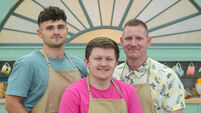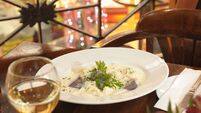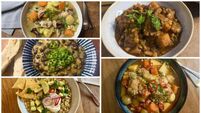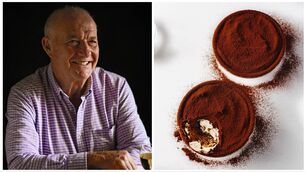'It was completely new and different': Denis Cotter on 30 years of Café Paradiso in Cork

Denis Cotter, owner and executive chef of Paradiso in Cork. Pic: David Creedon
At the 2023 Irish Food Writing Awards, held at the end of October in the salubrious surroundings of Dublin’s RDS, where over 90 nominees for multiple awards attended a splendid banquet in the vast library, the reaction and applause was especially heartfelt as Denis Cotter headed to the stage to receive the award for Best Irish Cookbook for Paradiso: Recipes and Reflections (Nine Bean Rows Books).
It was the cherry, on the icing, on top of the cake in a very special year for Cotter — actually, make that “years”, for just days before, his internationally renowned, multi-award-winning vegetarian restaurant celebrated the 30th anniversary of its founding in 1993.
Cotter grew up in Macroom, in West Cork, the second child in a family of four boys and one girl, and his parents ran a printing works in the town.
“I had no real interest in food. Our meals were typical, traditional Irish stuff. My mother ran the shop and my father ran the printing press, so she was working full-time — cooking was a chore for her.
“Foodwise, I was picky. We ate mostly meat and potatoes, and the potatoes were easily the only enjoyable part of that.”
In an era of near-permanent recession, there were five standard options for school leavers, if you included the dole queue. The first three were emigration, college, or the civil service. Cotter, 17, opted for the fourth, “The Bank”, spending his first four years in Mitchelstown.
“There was nothing to do,” Cotter says, “but it’s where I first had to start cooking, in a shared house. I wasn’t a vegetarian, but tending towards it. We took turns, one guy would do chops, mine was a vegetable curry. Even then I never cooked meat and ate it without enthusiasm or interest.”
A transfer to Dublin was his escape hatch.
“Dublin in the early to mid-80s was grim and grey but very vibrant, despite the greyness, a very left-field, post-punk culture, alternative politics and vegetarianism was part of that. It was a cool place, great bars, cinema, music,
theatre.
“My favourite restaurant was a vegetarian place, Bananas, off the top of South Great George’s St. They had a standard short menu and at weekends, they did a more creative thing, very thoughtful, experimental. I tried to get a job there. I was trying to figure a way out of the bank, looking for something else and settled on cooking. Giving up the bank in 1985 was considered a bad move, but my mother was very supportive, she could see I wasn’t happy.”
Cotter emigrated to London, to find a cheffing job and wound up in Cranks, an English chain of wholefood vegetarian restaurants that ran for over 40 years until 2002.
“Staff rotated quickly, mainly Aussies passing through London, and it was easy enough to get in.
“I started on the floor clearing tables, then serving behind the counter, then the bakery, and finally in the kitchen — in just a year and a half.
“I knew very little really when I started, just cooking very simple food at home. Their systems were very good, training and assessments were top class and made staff competent.”
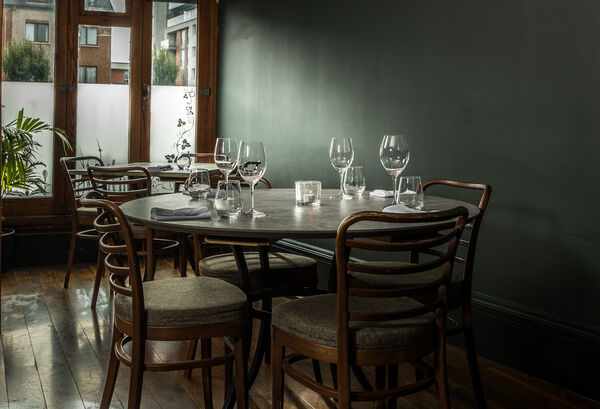
Cotter returned to Cork in the late 80s.
“I came back intending to open my own place and got a temporary job in the Quay Co-op [wholefood vegetarian café/shop], but stayed for four years. I really had so little experience so those years made a big difference. There were good people there, but they only wanted part-time jobs. I walked in and said: ‘I can run this if you let me’. I basically brought all the Cranks’ systems, and some recipes as well to be honest, and streamlined it.”
Cotter introduced an à la carte evening service, and it soon became a hot ticket around town.
Vegetarians and carnivores alike were wowed by a strong menu, served up in one of the most beautiful dining rooms in the city.
“It went OK but clashed with the ethos of the place. They didn’t think the Quay Co-op should be a ‘fancy restaurant’, it was going against the grain. I needed to go out on my own.”
Cotter opened Café Paradiso, on Lancaster Quay, in Cork city, with then-partner Bridget Healy, in 1993.
“I remember the first lunch, we did 50, it was jammers. I don’t remember working the shift, but I remember afterwards being elated and absolutely exhausted. People loved it, it was completely new and different to anywhere else in Ireland. I see that now, like a restaurant from ‘somewhere else’, a fantastic new modern place.”
Months later, in February 1994, Seamus O’Connell opened The Ivory Tower, another iconoclastic and hugely influential Irish restaurant.
Cork had always served as a pathfinder for Irish hospitality, but these Young Turks were not only operating the two best restaurants in Ireland, both veered wildly from the traditional fine dining model. The country had never seen anything like either restaurant.
“Any other food scene in Ireland, Kinsale or whatever, seemed very old school compared to what was happening in Cork. It was incredible, such a buzz. Seamus and I used to go out and talk a lot and we assumed there was a similar wave of new chefs behind us, but that didn’t really happen for a long time.
“I was just cooking the way I liked to eat at home, a lot of highly flavoured food: Asian-style spices, creams, risottos, cheese. It was also a very deliberate decision to create something very distinct from how vegetarian food was perceived, a deliberate decision to leave out pulses, brown rice, even rice in general.
“There was always an ambition for Café Paradiso to be a very different style of vegetarian restaurant, a mainstream restaurant that happened to serve vegetarian food, and I wanted to be treated like other mainstream restaurants that I admired. It still is the case today.
“For a long time, lunch was very much the focus; at night I was trying to push the boat out a little more, but it took a good long while to become more of an ‘evening restaurant’.
“I didn’t anticipate the level it went to, how excited people got, and it became increasingly successful over time, going way beyond my ambition for it.
“I wanted acceptance from the mainstream, but I couldn’t have foreseen it turning out the way it did; it grew from people’s response.”
Gradually, Cotter’s focus honed in on the produce coming into his kitchen.
“The focus became more on the ingredients, specific veg and what to do with them. I didn’t have a traditional reference for them anyway—even though kale might have had a place in Irish and English cooking, I had never cooked it. To me, it was just a green thing.”
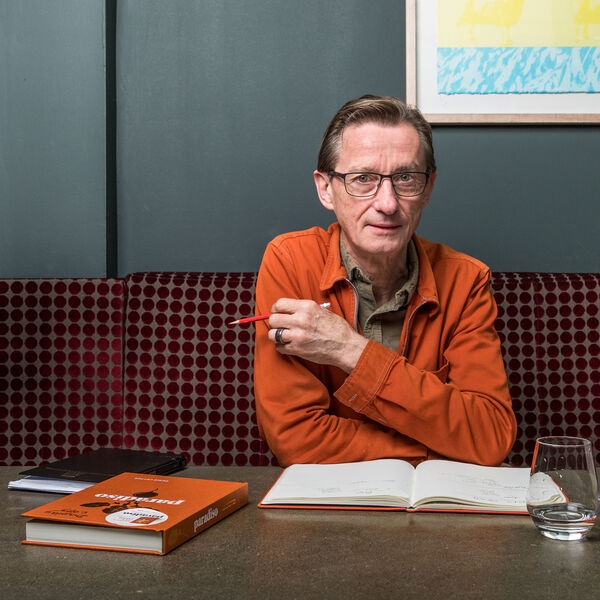
There have always been globally renowned restaurants helmed by star chefs that appear to capture the culinary zeitgeist, setting trends, dictating the pace in contemporary cooking of their respective eras.
Then there is another, infinitely smaller, coterie that are even more influential, but as much for the ethos or the guiding philosophy that informs their raison d’être, as for the specifics and standards of technique, texture, and flavour in what is served up on the plate.
It is obvious now in hindsight, but this was especially true of Paradiso, pretty much the first anywhere to present vegetarian cooking as a fine dining proposition.
It was eight years later before renowned Parisan chef Alain Passard gambled by converting his three-Michelin-starred restaurant, L’Arpège, entirely over to a vegetarian menu, in 2001.
Renowned US food writer Coleman Andrews, a judge for the Irish Food Writing Awards said, in his citation for Cotter’s winning tome: “Darina Allen once told me she had eaten in Paradiso several times [back in the 90s], before she even tumbled to the fact that there was no meat on the menu.”
But what turned Paradiso into a globally unique restaurant was Cotter’s collaboration with Ultan Walsh and Lucy Stewart of Gort na Nain Farm, in Nohoval, Co Cork, beginning in 2001.
“We started with simple stuff, a mutual interest — in particular vegetables — and how to treat them, but it changed the way we worked from ‘recipe driven’ to ‘produce driven’, a response to produce rather than coming up with a recipe and sourcing the ingredients.”
By the following year, Walsh was the restaurant’s main supplier.
Walsh not only grew produce of extraordinary quality, but often introduced commercial crops of exotic vegetables for the first time to Ireland, including Crown Prince squash, blue potatoes, aubergines, artichokes, scorzonera and beans (broad, borlotti etc), at one point growing over 100 different varieties of produce each year.
Crucially, planting was planned at the start of the growing season by Walsh and Cotter, a model now found in other world restaurants.
“We are doing it now for close to two decades,” Cotter says, “it is still at the heart of how we put our menus together, focussed most of the time on an ingredient from the farm.”
As the 21st century approached mid-teens, Paradiso (having shed the ‘café’) was beginning to fall off the radar for some critics and diners.
Even certain former champions began dismissing the restaurant as yesterday’s news, focusing elsewhere in their pursuit of the hottest new on-trend restaurant/chef/cuisine.
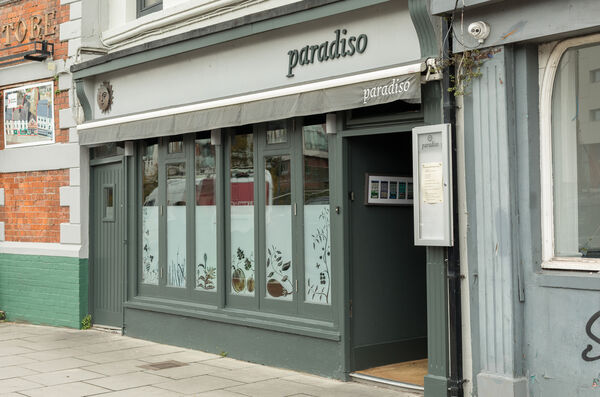
But, in 2019, Cotter’s and Walsh’s symbiotic and globally groundbreaking partnership was honoured with the Collaboration of the Year prize, at the inaugural and highly prestigious World Food Awards.
It began an Irish reappraisal that has never since let up.
“Paradiso seems to me to be one of the most interesting places in working for the future,” World Restaurant Awards co-founder Andrea Petrini said to the Irish Examiner at the time, “a future with closer and more prolific collaborations between chefs and suppliers.”
Cotter’s talent as a writer was evident from his first book, Café Paradiso Cookbook, published in 1999.
“I wanted to write — and write around food, not necessarily about food — connecting a lot of it to childhood and the wider culture, exploring something wider than a foodie notion of ‘I love eating’ …. [The latest book] Paradiso came about through a realisation we were selling books that were completely outdated, in comparison to the food we are serving now.”
There are recipes and techniques but Paradiso, the cookbook, is equally a distillation of the ethos that has made the little Cork restaurant so influential. It is an exquisite production, both photography and writing, but there is a sense Andrews’ selection was also swayed by the restaurant’s global impact: “It is the work,” he wrote, “of one of Ireland’s most innovative — and best — chefs, a man who dedicated himself to meatless cooking decades before it was the trendy thing to do.”
These days, Cotter is executive head chef, no longer in the kitchen on a daily basis, and divides his time equally between the restaurant and Maureen’s, the pub in Shandon he owns and operates with his partner Maureen McLaughlin.
“Part of creating the book was for it to serve as a launching pad for the future, as much as a summing up of the past, the starting point for the next period of Paradiso. There is a repertoire, an ethos, and I don’t see why that can’t continue.
“There is no reason for Paradiso to shut down if I don’t cook in it, it’s almost independent of me, and I’m increasingly comfortable with that.”
And what of Paradiso’s legacy?
“It’s not wrong to say Paradiso has been an inspiration and influence on Irish food, more so in terms of how people source ingredients than anything to do with vegetarianism — and that is something I’m really proud of, to be honest.”



